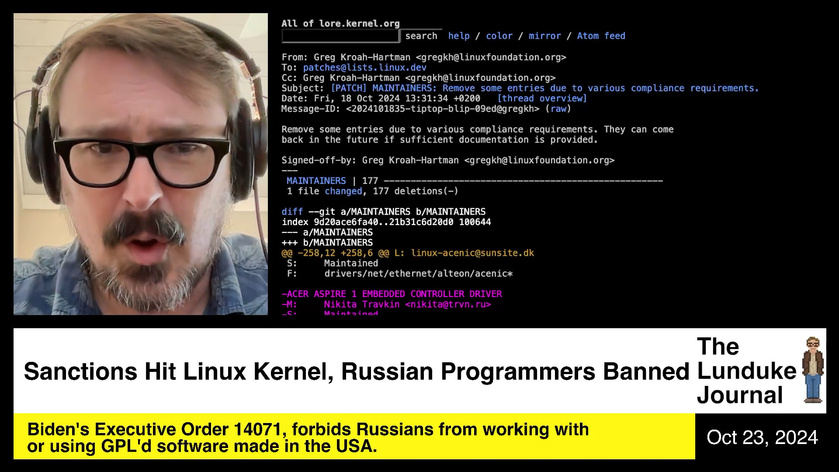Inadequate Litigant’s Cases Dismissed
Plaintiff, by her Litigation Appears to Establish the Report for a Mental Health Evaluation Was Appropriate
Read the full article at https://lnkd.in/gECRyZ-f, see the full video at https://lnkd.in/gs_4Bby9 and at https://lnkd.in/g67dDK8q, and https://zalma.com/blog plus more than 4950 posts.
Post 4950
In Samreen Riaz v. State Of California, et al., F087504, California Court of Appeals, Fifth District (December 2, 2024) the California Court of Appeals found itself asked to resolve suits against an individual and the state of California from an inadequate but excessively litigious plaintiff.
FACTS
Samreen Riaz was a licensed dentist – she lost her license to practice because of the facts underlying this case. According to her, there is an elaborate conspiracy to harass, stalk, threaten, and ultimately prevent her from testifying in a separate “whistleblower” case involving “OSHA and HIPPA Violations” at a medical facility.
Riaz sued raising numerous claims against numerous individuals and government entities. The opposing parties challenged the complaint’s viability through demurrer and anti-SLAPP proceedings. The trial court sustained the demurrers and granted the anti-SLAPP motion, leaving Riaz with no viable claim. Riaz appealed.
BACKGROUND
The facts underlying this case involve four discrete events.
First: Riaz sued a medical facility and suffered an alleged eye injury while attempting to testify in that case.
Second: She sought treatment for that eye injury but was refused service and then sued that doctor in small claims court.
Third: That doctor reported Riaz to the Dental Board of California which, in turn, initiated mental health competence proceedings against Riaz.
Fourth: Riaz’s license to practice dentistry was revoked, and she filed the complaint at issue in this case.
Initial Lawsuit Against Medical Facility
Acting as a “whistleblower,” Riaz “disclosed … OSHA, Hippa, recruited patient, potential insurance fraud and anti-competent activities in the market” at a medical facility.
After filing a lawsuit on that basis, Riaz claimed she suffered “organized harassment,” culminating in “permanent eye damage” after a sheriff-department employee pointed a finger in her face while attempting to enter the courthouse in her “whistleblower” case.
Visiting Doctor for Eye Injury
Riaz visited Dr. Cantrell to treat an eye injury. She claimed Cantrell became combative, refused to answer Riaz’s questions, and declined to treat Riaz. The next day, Riaz filed a complaint with the Medical Board of California.
Several days later, she filed a small claims case against Cantrell, essentially alleging discrimination, negligence, and retaliation. A small claims judgment was eventually entered in Cantrell’s favor.
Report to Dental Board
Cantrell reported Riaz to the Dental Board. The Dental Board issued an order to Riaz to comply with a mental health examination “to evaluate her fitness to practice safely ….” (See Bus. &Prof. Code, § 820.) Riaz failed to comply with the order. Since Riaz continued to disobey the order, her license to practice dentistry was ultimately revoked.
Instant Complaint and Judgment
Riaz sued Cantrell, various government entities, and several individuals working for those entities (collectively, the State). The complaint alleged an elaborate conspiracy among all the defendants to injure Riaz, to intimidate her to prevent her from testifying, and to retaliate against her for the “whistleblower” case.
The trial court sustained the demurrers and granted the anti-SLAPP motion resulting in total dismissal.
DISCUSSION
Did the trial court err in granting the anti-SLAPP motion?
Did it err in sustaining the demurrers?
The California Court of Appeals concluded the trial court did not err.
Anti-SLAPP Motion
In the anti-SLAPP motion, Cantrell argued his furnishing information to the Dental Board was protected activity and defeated claims “for discrimination, fraud, defamation, retaliation[,] and intentional infliction of emotional distress[.]”
In opposition to the anti-SLAPP motion, Riaz claimed again Cantrell “made inaccurate, knowingly misleading statements to the [D]ental [B]oard to defame and harm [Riaz] based on disclosing patient information.” The trial court concluded furnishing those documents to the board constituted protected activity.
ANALYSIS
Litigation of an anti-SLAPP motion involves a two-step process. First, the moving defendant bears the burden of establishing that the challenged allegations or claims that arise from protected activity in which the defendant has engaged. Second, for each claim that does arise from protected activity, the plaintiff must show the claim has at least minimal merit. If the plaintiff cannot make this showing, the court will, and did, strike the claim.
If there is no merit, the claim is stricken. The Court of Appeals noted that Riaz failed to adduce any evidence-including exhibits, declarations, judicial notice, and testimony-to substantiate her allegation Cantrell reported her to the Dental Board for retribution. She failed to adduce admissible evidence on the point.
DEMURRERS
Both Cantrell and the State filed demurrers to Riaz’s complaint..
Additional Background
A small claims plaintiff is collaterally estopped from relitigating the same issue in superior court where the record is sufficiently clear to determine that the issue was litigated and decided against plaintiff in the small claims action.
Governmental immunity is an affirmative defense properly raised by demurrer. Government Code section 821.6 immunizes public employees from liability for ‘instituting or prosecuting any judicial or administrative proceeding’ within the scope of their employment, even if the employees act ‘maliciously and without probable cause.
Riaz alleged her claims arose in July 2022. Her written government claim was submitted in April 2023, more than six months later. Accordingly, the claims were barred, at least insofar as they stemmed from the section 820 order.
CONCLUSION AND SUMMARY
Riaz failed to allege colorable claims against either Cantrell or the State. The potential claims against Cantrell were either tried and resolved against her in small claims court or dismissed pursuant to the anti-SLAPP statute. The potential claims against the State were either barred for failure to timely present them under the Government Claims Act, or the State was immune under Government Code sections 821.6, 818.4, and 821.2.
ZALMA OPINION
It is axiomatic that a person who represents himself has a fool for a client. The litigation history, the multiple actions, and the lack of consistency and evidence, establish that Dr. Cantrell was correct when he advised the Dental Board that a mental health examination to evaluate her fitness to practice safely…” was correct. She refused to fulfill her obligation to the Dental Board to be evaluated because she was concerned she would not pass. This case is an abuse of Doctor Cantrell and the state and should have resulted in serious sanctions.
(c) 2024 Barry Zalma & ClaimSchool, Inc.
Please tell your friends and colleagues about this blog and the videos and let them subscribe to the blog and the videos.
Subscribe to my substack at https://barryzalma.substack.com/subscribe
Go to X @bzalma; Go to Newsbreak.com https://www.newsbreak.com/@c/1653419?s=01; Go to Barry Zalma videos at Rumble.com at https://rumble.com/account/content?type=all; Go to Barry Zalma on YouTube- https://www.youtube.com/channel/UCysiZklEtxZsSF9DfC0Expg
Go to the Insurance Claims Library – https://lnkd.in/gwEYk
Inadequate Litigant’s Cases Dismissed
Plaintiff, by her Litigation Appears to Establish the Report for a Mental Health Evaluation Was Appropriate
Read the full article at https://lnkd.in/gECRyZ-f, see the full video at https://lnkd.in/gs_4Bby9 and at https://lnkd.in/g67dDK8q, and https://zalma.com/blog plus more than 4950 posts.
Post 4950
In Samreen Riaz v. State Of California, et al., F087504, California Court of Appeals, Fifth District (December 2, 2024) the California Court of Appeals found itself asked to resolve suits against an individual and the state of California from an inadequate but excessively litigious plaintiff.
FACTS
Samreen Riaz was a licensed dentist – she lost her license to practice because of the facts underlying this case. According to her, there is an elaborate conspiracy to harass, stalk, threaten, and ultimately prevent her from testifying in a separate “whistleblower” case involving “OSHA and HIPPA Violations” at a medical facility.
Riaz sued raising numerous claims against numerous individuals and government entities. The opposing parties challenged the complaint’s viability through demurrer and anti-SLAPP proceedings. The trial court sustained the demurrers and granted the anti-SLAPP motion, leaving Riaz with no viable claim. Riaz appealed.
BACKGROUND
The facts underlying this case involve four discrete events.
First: Riaz sued a medical facility and suffered an alleged eye injury while attempting to testify in that case.
Second: She sought treatment for that eye injury but was refused service and then sued that doctor in small claims court.
Third: That doctor reported Riaz to the Dental Board of California which, in turn, initiated mental health competence proceedings against Riaz.
Fourth: Riaz’s license to practice dentistry was revoked, and she filed the complaint at issue in this case.
Initial Lawsuit Against Medical Facility
Acting as a “whistleblower,” Riaz “disclosed … OSHA, Hippa, recruited patient, potential insurance fraud and anti-competent activities in the market” at a medical facility.
After filing a lawsuit on that basis, Riaz claimed she suffered “organized harassment,” culminating in “permanent eye damage” after a sheriff-department employee pointed a finger in her face while attempting to enter the courthouse in her “whistleblower” case.
Visiting Doctor for Eye Injury
Riaz visited Dr. Cantrell to treat an eye injury. She claimed Cantrell became combative, refused to answer Riaz’s questions, and declined to treat Riaz. The next day, Riaz filed a complaint with the Medical Board of California.
Several days later, she filed a small claims case against Cantrell, essentially alleging discrimination, negligence, and retaliation. A small claims judgment was eventually entered in Cantrell’s favor.
Report to Dental Board
Cantrell reported Riaz to the Dental Board. The Dental Board issued an order to Riaz to comply with a mental health examination “to evaluate her fitness to practice safely ….” (See Bus. &Prof. Code, § 820.) Riaz failed to comply with the order. Since Riaz continued to disobey the order, her license to practice dentistry was ultimately revoked.
Instant Complaint and Judgment
Riaz sued Cantrell, various government entities, and several individuals working for those entities (collectively, the State). The complaint alleged an elaborate conspiracy among all the defendants to injure Riaz, to intimidate her to prevent her from testifying, and to retaliate against her for the “whistleblower” case.
The trial court sustained the demurrers and granted the anti-SLAPP motion resulting in total dismissal.
DISCUSSION
Did the trial court err in granting the anti-SLAPP motion?
Did it err in sustaining the demurrers?
The California Court of Appeals concluded the trial court did not err.
Anti-SLAPP Motion
In the anti-SLAPP motion, Cantrell argued his furnishing information to the Dental Board was protected activity and defeated claims “for discrimination, fraud, defamation, retaliation[,] and intentional infliction of emotional distress[.]”
In opposition to the anti-SLAPP motion, Riaz claimed again Cantrell “made inaccurate, knowingly misleading statements to the [D]ental [B]oard to defame and harm [Riaz] based on disclosing patient information.” The trial court concluded furnishing those documents to the board constituted protected activity.
ANALYSIS
Litigation of an anti-SLAPP motion involves a two-step process. First, the moving defendant bears the burden of establishing that the challenged allegations or claims that arise from protected activity in which the defendant has engaged. Second, for each claim that does arise from protected activity, the plaintiff must show the claim has at least minimal merit. If the plaintiff cannot make this showing, the court will, and did, strike the claim.
If there is no merit, the claim is stricken. The Court of Appeals noted that Riaz failed to adduce any evidence-including exhibits, declarations, judicial notice, and testimony-to substantiate her allegation Cantrell reported her to the Dental Board for retribution. She failed to adduce admissible evidence on the point.
DEMURRERS
Both Cantrell and the State filed demurrers to Riaz’s complaint..
Additional Background
A small claims plaintiff is collaterally estopped from relitigating the same issue in superior court where the record is sufficiently clear to determine that the issue was litigated and decided against plaintiff in the small claims action.
Governmental immunity is an affirmative defense properly raised by demurrer. Government Code section 821.6 immunizes public employees from liability for ‘instituting or prosecuting any judicial or administrative proceeding’ within the scope of their employment, even if the employees act ‘maliciously and without probable cause.
Riaz alleged her claims arose in July 2022. Her written government claim was submitted in April 2023, more than six months later. Accordingly, the claims were barred, at least insofar as they stemmed from the section 820 order.
CONCLUSION AND SUMMARY
Riaz failed to allege colorable claims against either Cantrell or the State. The potential claims against Cantrell were either tried and resolved against her in small claims court or dismissed pursuant to the anti-SLAPP statute. The potential claims against the State were either barred for failure to timely present them under the Government Claims Act, or the State was immune under Government Code sections 821.6, 818.4, and 821.2.
ZALMA OPINION
It is axiomatic that a person who represents himself has a fool for a client. The litigation history, the multiple actions, and the lack of consistency and evidence, establish that Dr. Cantrell was correct when he advised the Dental Board that a mental health examination to evaluate her fitness to practice safely…” was correct. She refused to fulfill her obligation to the Dental Board to be evaluated because she was concerned she would not pass. This case is an abuse of Doctor Cantrell and the state and should have resulted in serious sanctions.
(c) 2024 Barry Zalma & ClaimSchool, Inc.
Please tell your friends and colleagues about this blog and the videos and let them subscribe to the blog and the videos.
Subscribe to my substack at https://barryzalma.substack.com/subscribe
Go to X @bzalma; Go to Newsbreak.com https://www.newsbreak.com/@c/1653419?s=01; Go to Barry Zalma videos at Rumble.com at https://rumble.com/account/content?type=all; Go to Barry Zalma on YouTube- https://www.youtube.com/channel/UCysiZklEtxZsSF9DfC0Expg
Go to the Insurance Claims Library – https://lnkd.in/gwEYk
0 Commentaires
0 Parts
1KB Vue













